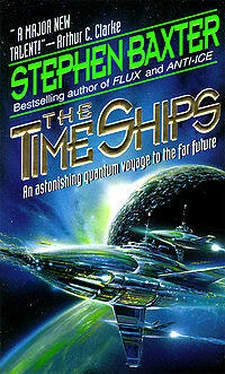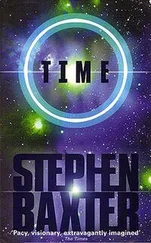“But it is not like that. The totality of the Constructors’ mental universe is too big.” He referred to the Information Sea again, and described how structures of thought and speculation — complex, evolving, evanescent — came and went, emerging from the raw materials of that ocean of mentation. “These structures are analogous to the scientific theories of your own day — constantly under stress, from new discoveries and the insights of new thinkers. The world of understanding does not stay still, you see…
“And besides, remember your friend Kurt Gödel, who taught us that no body of knowledge can be codified and made complete.
“The Information Sea is unstable. The hypotheses and intentions which emerge from it are complex and multi-faceted; there is rarely complete unanimity among the Constructors about any point. It is like a continuing, emerging debate; and within that debate, factions may emerge: groupings of quasi-individuals, coalescing around some scheme. One might say that the Constructors are united in their drive to advance the understanding of their species, but not so as regards the means by which this might be achieved. In fact, one might hypothesize in general, the more advanced the mentation, the more factions appear to emerge, because the more complex the world appears…
“And thus, the race progresses.”
I remembered what Barnes Wallis had told me of the new order of Parliamentary debate, in 1938, where Opposition had essentially been banned as a criminal activity — a divergence of energy from the one, selfevidently correct approach to things! — But if what Nebogipfel was saying was correct, there can be no universally correct answer to any given question: as these Constructors had learned, multifarious views are a necessary feature of the universe in which we find ourselves!
Nebogipfel chewed patiently on his cheese stuff; when he was done, he pushed the plate back into the substance of the Constructor, where it was absorbed — it was comforting for him, I thought, for it was a process so like the extruding Floor of his own home Sphere.
I spent many hours alone, or with Nebogipfel, at the windows of our apartment.
I saw no evidence of animal or vegetable life on the surface of White Earth. As far as I could tell, we were isolated in our little bubble of light and warmth, atop that immense tower; and we never left that bubble, in all the time we were there.
At night the sky beyond our windows was generally clear, with only a light frosting of cirrus cloud high in the depleted, lethal atmosphere. But, despite this clarity — I still could not understand it — there were no stars — or rather, very few, a handful compared to the multitude which had once blazed down on the earth. I had made this observation on our first arrival here, but I think I had dismissed it as some artifact of the cold, or my disorientation. To have it confirmed, now that I was warm and clear-headed, was disturbing — perhaps the strangest single thing in this new world.
The moon — that patient companion planet — still turned about the earth, going through its phases with its immemorial regularity; but its ancient plains remained stained green. Moonlight was no longer a thing of cool silver, but washed the landscape of White Earth with the gentlest verdant glow, returning to the earth an echo of that green-ness she had once enjoyed, and which was now locked under the unforgiving ice.
I saw again that gleam, as if of a captive star, that shone steadily at us from the moon’s extreme easterly limb. My first speculation had been that I was seeing the reflection of the sun from some lunar lake, but the glare was so steady that eventually I decided that it must be purposeful. I imagined a mirror — an artificial construct — perhaps fixed to some lunar mountain-top, and designed so that its reflection always falls on the earth. As to the purpose of such a device, I speculated that it might date from a time when the degradation of atmospheric conditions, here on the Mother Planet, had not yet become so bad as to drive men off the earth, but, perhaps, were so severe that they had caused the collapse of whatever culture had survived.
I imagined moon-men: Selenites, as we might call them, themselves descended from Humanity. The Selenites must have watched the lethal progress of the great fires which broke across the crust of the oxygen-choked earth. The Selenites had known that men still lived on the earth — but they were men fallen from civilization, men living as savages, even as animals once more, sliding back into some pre-rational state. Perhaps the collapse of the earth impacted them too — for it may be that Selenite society could not survive without provision from Mother Earth.
The Selenites could grieve for their cousins on the Mother World, but could not reach them… and so they attempted to signal. They built their immense mirror — it must have been half a mile across, or more, to be visible across inter-planetary distances.
The Selenites may even have had some more ambitious aim in mind than simple inspiration from the sky. For example, they may have sent — by making the mirror flicker, using some equivalent of Morse — instructions on crop-rearing, or engineering — the lost secrets of the steam engine, perhaps — something, at any rate, rather more useful than mere good-luck messages.
But in the end it was to no avail. In the end, the fist of Glaciation closed about the land. And the great lunar mirror was abandoned, as men disappeared from the earth.
Such, at any rate, was my speculation, as I stood gazing through the windows of my tower; I have no means of knowing if I was right — for Nebogipfel was unable to read this new History of Humanity in such detail — but in any event the gleam of that isolated mirror on the moon became, for me, a most eloquent symbol of the collapse of Humanity.
The most striking feature of our night sky was not the moon, however, nor even that absence of stars: it was the great, weblike disc, a dozen times Luna’s width, that I had noticed on our first arrival. This structure was extraordinarily complex and alive with motion. Think of a spider-web, perhaps lit from behind, with drops of dew glistening and rolling over its surface; now envisage a hundred tiny spiders crawling over that surface, their motion slow but quite visible, evidently working to strengthen and extend the structure — and then cast your vision across many miles of inter-planetary space! — and you will have something of what I saw.
I made out the web-disc most clearly in the early hours of the morning — perhaps around three o’clock — and at such times I was able to make out ghostly threads of light — tenuous and thin — which reached up, from the far side of the earth, and out through the atmosphere towards the disc.
I discussed these features with Nebogipfel. “It’s quite extraordinary… it’s as if those beams make up a kind of rigging of light, which attach the disc to the earth; so that the whole affair is like a sail, towing the earth through space on some spectral wind!”
“Your language is picturesque,” he said, “but it captures something of the flavor of that enterprise.”
“What do you mean?”
“That it is a sail,” he said. “But it is not towing the earth: rather, the earth is providing a base for the wind which drives the sail.”
Nebogipfel described this new type of space yacht. It would be constructed in space, he said, for it would be much too fragile to haul upwards from the earth. Its sail consisted, essentially, of a mirror; and the ’wind’ which filled the sail was light: for particles of light falling on a mirrored surface deliver a pushing force, just as do the molecules of air which make up a breeze.
Читать дальше
Конец ознакомительного отрывка
Купить книгу









